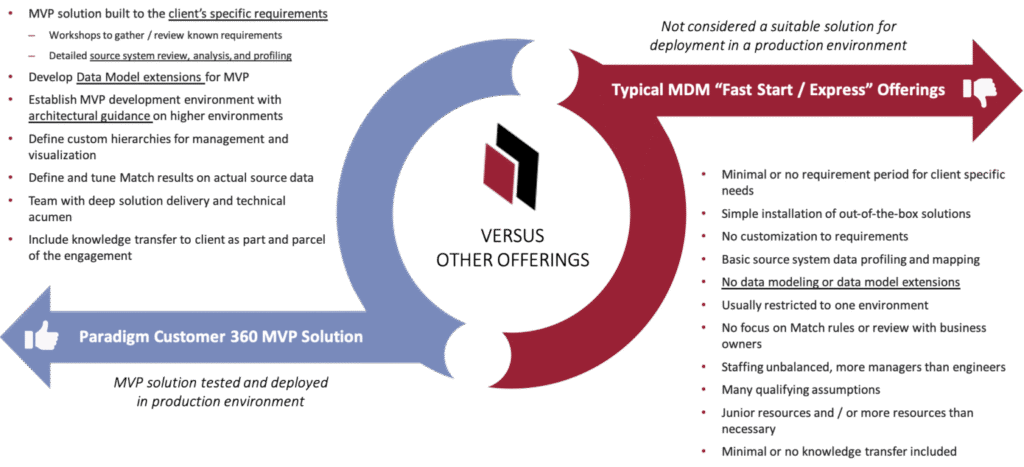
By John Tuttle, Senior Director of MDM
How do you quickly start an MDM program?
The ability to quickly start a Master Data Management program becomes a critical success factor as companies are investing more resources into digital transformation programs. As a central factor in a large enterprise transformation initiative, the MDM program is usually a key starting point and impacts an organization’s ability to quickly and effectively adopt new systems that lead to the future state vision.
So, the question is, “How do I get started quickly?” Many other service providers are offering quick, pre-packaged approaches that promise a fast start or an express timeframe for starting MDM projects. But how much value do they provide?
What is the value of a pre-packaged offering?
There is value to taking a pre-packaged approach, primarily a small, usually fixed, up-front investment. A company is able to get a “first glimpse” at the MDM product that has been purchased and gives them more time to organize the next phases of a project or overall program. The limitation is that a pre-packaged timeline is usually not flexible enough to accommodate any changes or customization to the solution being implemented.
Do requirements matter?
The strength of any MDM system is the ability to make specific additions and custom logic based on business requirements. Often, the most important data attributes for a company are those that differentiate their business from other businesses. The pre-built MDM solutions are based on common, well known data models that fit very well to most business cases. However, to add the most value to an implementation, the system needs to support all known data requirements and those extra, business specific attributes are valuable beyond this core set of attributes. This can be thought of as the “secret sauce” or recipe for success when it comes to digital transformation journeys. Implementations would not be complete or as valuable without them.
To gain the most value out of the investment that companies make in an MDM system, you must include these business specific requirements in any full implementation. Most of the accelerated packaged service approaches actually exclude these customizations and preclude any discussions of requirements until after the fixed time period is completed. This is not an efficient method of implementation as time is spent on deploying a pre-built solution and is lost on gathering requirements and gaining momentum with the business sponsors. At Paradigm Technology, we have a different approach.

Paradigm MVP vs. Other Offerings
MVP solution approach at Paradigm Technology
Our MVP approach to MDM implementations is different in that we focus on the requirements that will make the system viable for business use. The term “MVP” is taken from Agile methodologies and stands for Minimal Viable Product. In practice, the pre-built applications that are deployed by fixed service offerings are not fully viable out of the box. Customizations are needed. In fact, many offerings explicitly state that they are not to be considered a suitable solution for deployment in a production environment. We focus on identifying and creating a solution that is meant to be deployed to production quickly and allows future expansions in subsequent phases or sprints.
The Paradigm MVP approach looks at extensions to the data model for business-specific attributes needed for the initial implementation. We review source systems and include analysis and profiling results, give guidance on technical architecture for production environments, review custom hierarchy needs, and define and tune match rules for rapid deployment. The MVP approach is most often used to deploy the Informatica Customer 360 solution, but can be tailored to other domain solutions or to pre-built industry solutions.
Our experienced team works with clients and their personnel to implement the MVP solution to kick-start their MDM program and start down the path of a digital transformation journey. Are you ready for our help on your journey?

